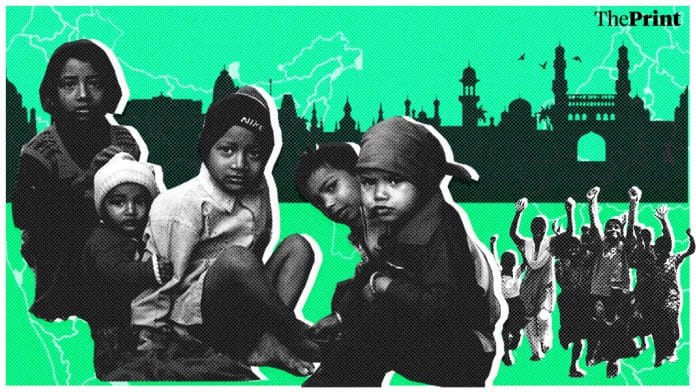According to U.S. News and World Report’s global perceptions-based survey on the best countries to raise children in, India ranks at 65 out of 80 countries. The top country is Sweden.
ThePrint asks: As India falls 7 spots in global ranking, is it a safe country to raise children?
India, which doesn’t invest adequately in health and education, is no country for children
 Kaveree Bamzai
Kaveree Bamzai
Senior journalist
The Best Countries to Raise Kids ranking draws from a global perceptions-based survey and ranks countries based on scores from a compilation of eight country attributes: cares about human rights, family-friendly, gender equality, happy, income equality, safe, well-developed public education system and well-developed health care system.
Is it a surprise that India has dropped seven places?
Nobel Laureate Amartya Sen argued that no country can progress unless it invests in education and healthcare. But India is no country for children. Education spending is down and a new national education policy has been in limbo for five years. Spending on health has risen, but only marginally.
But according to a recent study in the British Medical Journal, the Indian medical industry fares poorly on many critical parameters, including quality of health care as well as qualification of doctors—54 per cent of health professionals in India do not have proper qualifications, while 20 per cent of adequately qualified doctors are not part of the workforce.
Is it any surprise that China, which invested in healthcare and education, grew its GDP per capita from $190 in 1978 to $5,432 in 2011? And that India is delighted at the prospect of raising its GDP per capita to $3,200 by next year. Modest expectations can only create a generation of stunted human capital.
Also read: More Indians now maintain age gap of 3 years between two children, shows survey
When it comes to working parents, India is a very affordable country to raise children in
 Remya Nair
Remya Nair
Senior associate editor, ThePrint
Safety is an important aspect of child raising, and unfortunately, India lags behind in this aspect. It has found it difficult to ensure the safety of children even in school premises or school buses, making parents anxious while sending their children to schools.
Many Indian cities are also battling pollution problems that impact a child’s health and development. But many other factors come into play when you decide where to bring up your child.
If both parents are working, a support mechanism is crucial. So typically, one prefers to stay near the grandparents or close to other family so that there is a lending hand available in times of need, especially in times of sickness or emergencies.
Childcare and education costs also come into play while making a decision. Indian cities offer much more affordable options in both these aspects compared to other developed countries.
To be sure, the Indian education system is often found lacking in promoting the all-round development of a child. The perception is that the Indian education system is much more rigorous when it comes to studies compared to other countries, but is not able to teach basic life skills to children.
Also read: Indian children are schooling, not learning. Modi govt must fix it with national edu policy
Only happy parents can raise happy children. Are Indians happy?
 Himani Chandna
Himani Chandna
Special correspondent, ThePrint
Even before parents start raising their child with the first drop of milk, he/she is exposed to harmful pollutants in the mother’s womb.
Once born, an increasing number of infants are being admitted in Intensive Care Units (ICUs) of hospitals – thanks to the country’s unattended crisis of air pollution.
The foremost step of raising children well is feeding them nutritious food. But that looks unlikely because the quality of fruits and vegetables available around us is dubious.
For instance, a study by the National Environmental Engineering Research Institute found that the vegetables supplied to large wholesale mandis “contain high doses of lead, which, on prolonged consumption, could trigger a range of diseases, including cancer, and damage organs.”
Such news items appear on a regular basis, but go unattended by the authorities concerned.
Even if the children survive hazardous air-quality and contaminated food, the increasing problem of intolerance, hate crimes, social instability, violence against women, caste and religion-based violence will end up impacting their quality of life.
Also, it won’t be easy for parents to raise ‘happy’ children while fighting the unemployment rate, which is at 6.1 per cent – a four-decade high.
After all, happy parents raise happy children.
If you are someone born and raised in India, in all likelihood you’ve already adapted to the situation
 Manasa Mohan
Manasa Mohan
Senior assistant editor, ThePrint
Depending on which socio-economic strata you belong to, India will be as safe as it is unsafe.
Perhaps, I speak from having learnt to let everyday injustices roll off my back — you can’t do this, this, this or that because I’m a woman — and that hasn’t really stopped me and the hundreds of women out there from doing what we want.
Naturally, a ‘safer’ city/neighbourhood/district/state will have probably meant more opportunities to defy the gender bias. But I’ll respond how I’ve responded to anyone who has asked me, “Is Delhi safe?” (You know, rape capital and all that)
For many Indians, the question they’re faced with is — do we have a choice?
If you are someone born and raised in India, in all likelihood you’ve already adapted to the situation. I’ll even make the argument that you’ve leaned into your ‘Indianess’ and embraced that magical quality of ‘jugaad’. We are genetically coded to survive like any other species (ask Darwin).
But to really consider not living in India means looking at it in the context of living in a city/country/continent that isn’t your own. Are you prepared for not quite fitting in, your children facing racial attacks, not getting permanent residency, losing your job without the support of decades of family roots in that country? The global economy is not what it used to be, and neither are the job opportunities abroad.
However, moving out of a country isn’t just about getting a good enough job. It has to do with your financials, family, ability to adjust to a new culture, being able to deal with a different climate, even food, etc.
Certainly, the trade-off is worth it if indeed you manage to live comfortably in any of the top 10, or even 20 countries that precede India on that list. But the reality, and probability, of that has been tipping towards the negative for a while.
India may be better than a few war-torn countries, but it’s definitely not the most just society to raise children in
 Sanya Dhingra
Sanya Dhingra
Principal correspondent, ThePrint
It is not quite surprising that India would rank 65 on a global index for best countries to raise children in – especially an index that takes into account how countries fare on human rights, gender equality, public education and healthcare system. To be sure, not all children have it bad in India. But a child’s well-being in the country depends entirely on her social and economic privilege. The state guarantees little security to the country’s children. Starting from education to healthcare to jobs to even the most basic access to environmental resources – children’s ability to thrive and do well in India varies depending on their family income, caste group and social status.
The one thing that India probably uniformly fares well on would be family cohesiveness. But for all its glorification, the Indian family thrives on warped and rigid gender roles, near-zero intra-family democracy, and oddly celebrates the lack of individual agency as evidence of “family values”.
If you are a girl child in India, irrespective of which class, caste or religion you belong to, you are invariably worse off than a male child in the same social strata. And that hierarchy does not just exist. It is perpetuated through the active participation of girls and women who are conditioned to celebrate their inferiority as culture. So, India may be better than a few war-torn countries, but it’s definitely not the most equal, happy or just society to raise children in.
By Neera Majumdar and Revathi Krishnan







Kaveree Bamzai can raise her children in Pakistan.
India needs these following things:
1. More schools or facilities for special children, children with various kinds of disabilities.
2. Beside the pocso act, there should be a more comprehensive system of laws to fight or prevent child abuse. It’s a time bomb.
3. More investment in mental health. Only mentally healthy parents can raise normal healthy kids.
4. Proper implementation of the teacher’s training . More stress on primary and preprimary.
5. A complete control of construction in cities. Open spaces are of major importance in bringing up healthy children.
Education in the country need a change
The answer to that question would depend almost entirely on how well off the parents are.